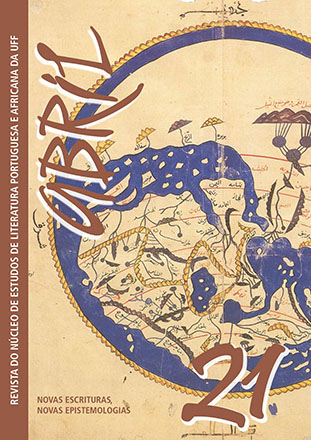Bantu Spiritualism in “O cesto de adivinhação” by Ana Paula Tavares
DOI:
https://doi.org/10.22409/abriluff.v10i21.29964Keywords:
Ana Paula Tavares, Angolan Literature, Bantu Spiritualism.Abstract
This article analyses some of the linguistic and literary strategies used by Ana Paula Tavares2 to describe the spiritual discourse of Bantu derivation in the chronicle (crônica) “O cesto de adivinhação”, taken from the book A cabeça de Salomé (2004)3. I will argue that, in this text, Tavares expresses the importance of spiritualism through the use of culture-bound terms, as well as the deployment of stylistic strategies, in order to redefine the Angola identity. The result of such literary creativity, matched with a deep historical and ethnographic investigation of the Bantu populations represented in her fictional work, supports the recreation of the Angolan identity that puts a great emphasis on aspects such as rituals, ancestral characters, and key figures that represent the culture of the native societies of the country. The aim is to discuss the ideological tensions and contradictions existing in Angola, as well as to inform and inspire a different perspective towards its multicultural society, through the words of the above author.
---
Original in English.
---
Downloads
Downloads
Published
How to Cite
Issue
Section
License
I authorize the journal Abril - NEPA/UFF to publish the paper of my authorship/responsibility that I now submit, in case it is accepted for online publication.
Moreover, I declare that this contribution is original, that it was not submitted to any other editor for publication, and I sign the present declaration attesting the truth of all its contents.
The copyright of the works published at the virtual space of the journal Abril - NEPA/UFF are automatically entitled to the journal. Their total or partial reproduction is conditioned to the authors' citations and publication data.

Abril is licensed under a Creative Commons - Attribution-NonCommercial 4.0 International (CC BY-NC 4.0).









